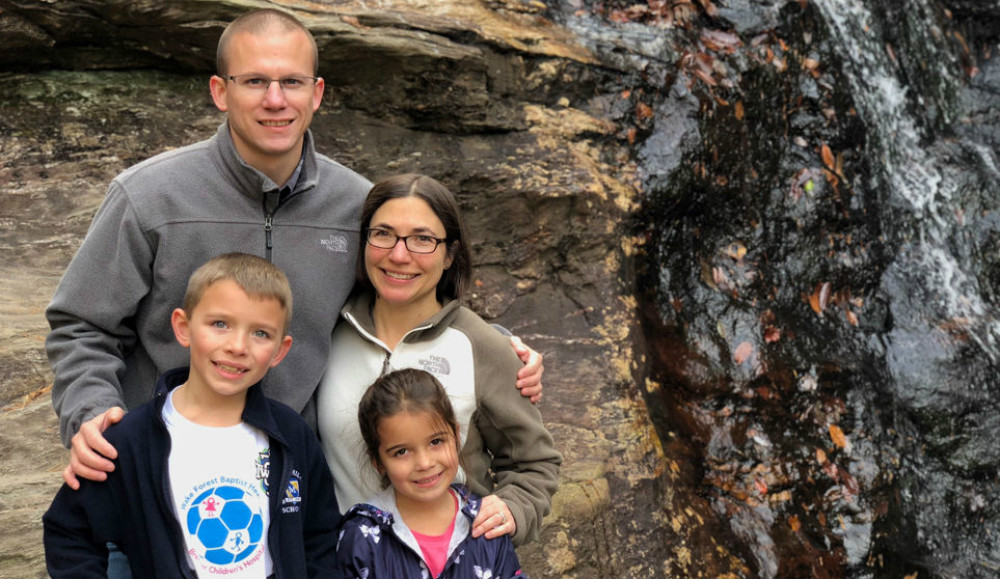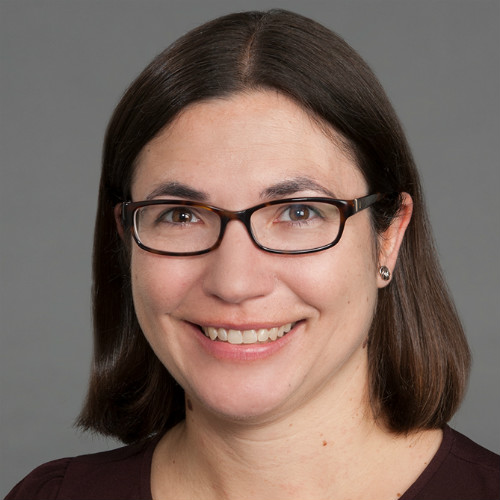

Donna Williams, MD, FACP
Associate Professor at Wake Forest School of Medicine, Winston-Salem, NC; Co-Director of Clinical Skills course for first- and second-year medical students; Core Faculty for the Internal Medicine Residency Program.
— MEDICAL SCHOOL —
Jefferson Medical College, Philadelphia, PA
— RESIDENCY —
Thomas Jefferson University Hospital, Philadelphia, PA
For many, the decision to go into medicine was shaped by a parent or relative who was already a doctor. Some children connect with a character from a book, film, or TV show and follow the path to medicine. It didn’t happen either of those ways for Dr. Donna M. Williams.
“I don’t have a particular moment that I can recall, but it was sometime in fourth or fifth grade when I decided that medicine would be a good career choice. As cliché as it sounds, my first thoughts were that ‘I love science, so I think being a doctor would be a good choice. I’d be able to help people,'” she says. “I got the idea to be a doctor at that young age and never changed my mind.” Since then, she has never been the type of person to have those ‘light bulb’ moments when you know what you’re supposed to be doing in life. “In medical school, I truly enjoyed everything. As I went through the pre-clinical courses, everything was interesting to me. In the third year of medical school during clinical rotations, I felt privileged to be part of each specialty, even if it was just for a short amount of time. I had a really hard time deciding where I would best fit as a physician.”
But Dr. Williams was able to determine what she didn’t want to do. “I did find out fairly early on that I was not a surgeon. The operating room did not feel like home to me. Even though I love children, being their doctor did not seem like the right fit for me, so pediatrics fell off the list. When it came time to decide what specialty to apply for, internal medicine made the most sense since it left so many doors open in terms of career opportunities.”
During her internal medicine residency, she found like-minded physicians in the hospitalist group. “They somehow had figured out how to balance life as busy physicians and parents, as well as how to serve as excellent educators and patient-care advocates. I was hopeful that I could grow into a skilled colleague among them. That ultimately drove me toward my first job at Jefferson, where I was a hospitalist and Assistant Program Director for the internal medicine residency program,” she says.
Family on the move
It’s all about the work you’ve done in your career, your flexibility, and the networks you have built along the way.
Dr. Williams met her husband while the two were studying at Jefferson Medical College in Philadelphia. “We got married during my residency and I knew with his goals of pursuing a vascular surgery fellowship and his Air Force commitment, moving would be part of life. I was excited to experience life in other areas of the country, as I spent my entire life before residency in southeastern Pennsylvania. As a result of our travels, this is my fourth job since I finished residency in 2007,” she says of her current position as an Associate Professor at Wake Forest School of Medicine in North Carolina.
“It has been difficult to leave a position I loved, and I’ve truly loved every career opportunity I’ve had so far; but it’s also been fun to reinvent my career with each move. I’ve learned a lot about flexibility and adjusting to new environments, and have enjoyed the adventure,” she says, adding that it can be both challenging and rewarding to adapt to different work cultures and locations. “Despite the obvious challenges, it has been very fulfilling because I’ve learned so much from each institution and have grown personally and professionally throughout the process.”
After her residency at Jefferson, Dr. Williams stayed on and worked as a hospitalist and Assistant Program Director. She then moved to Baltimore where she served as a hospitalist and Associate Program Director at St. Agnes Hospital. Having both university and community hospital experiences added to her understanding of hospital medicine and residency education. “When my husband completed his vascular surgery fellowship, the Air Force sent him to Northern California, so we moved across the country with our two young children.”
She was able to find new opportunities thanks to hard work and the relationships she’s made along the way. “It’s all about the work you’ve done in your career, your flexibility, and the networks you have built along the way.” When she was searching for work in California, she reached out to the program director at UC Davis, who she knew through the Association of Program Directors in Internal Medicine. “I reached out to him and said ‘we’re moving to California, is there any chance you have an opening?’ It turns out they were recruiting a new Associate Program Director, so the timing was perfect.”
It’s an exciting, dynamic profession... Internal medicine is ever-changing, ever-growing, and you get to learn something new every day.
“I spent five years at UC Davis in Sacramento working as an Associate Program Director and general internist, working both on the inpatient wards and in the outpatient clinic, while teaching residents and students. During my time there, I assumed the role of course director for the second-year medical school clinical skills course, which was a fantastic experience,” she says. In this role, she had the opportunity to learn about undergraduate medical education, while maintaining her presence in graduate medical education. “I grew so much as an educator and was able to change the direction of the course, which was challenging, exciting, and exhausting all at once.”
When her husband completed his military commitment, the family decided to move to North Carolina based on the best opportunities for the dual physician family. Dr. Williams says she emailed the chair of medicine at Wake Forest, where her husband had already interviewed. “I was able to present myself as a general internist and medical educator with valuable experience in both undergraduate and graduate medical education, which makes me a flexible addition to the group. Now we have adjusted to life in the Southeast and are enjoying our home and professional lives in Winston-Salem.”
ACP as a professional home
Dr. Williams first joined ACP during her residency and enjoyed participating in local ACP events. These early exposures led her to get more involved once she entered practice. “Early in my attending career, I sat on the Council of Young Physicians of the Southeastern Pennsylvania Chapter of the ACP. I learned a lot about the organization and the amazing things that ACP does for patient advocacy, for medical education of students and residents, as well as for early career physicians. ACP quickly became one of my professional homes.”
She has increased her involvement in ACP over time, including her work on the committee that published ACP’s 2016 edition of the High Value Care Curriculum for Educators and Residents. “High value care is an essential educational topic that I am very interested in and that I enjoy teaching. ACP has given me a platform to share my interests with a larger audience.” Dr. Williams currently serves on the Council for the North Carolina chapter of the ACP as well as on the Doctor’s Dilemma Question Development Committee for ACP on the national level.
‘Something new every day’
When medical students and residents are trying to figure out their professional path, Dr. Williams doesn’t hesitate to sell them on the benefits of a career in internal medicine. “It’s an exciting, dynamic profession. You can mold your career based on your long-term goals and interests. You can treat patients, participate in education and research, and help shape the face of healthcare for the future. Internal medicine is ever-changing, ever-growing, and you get to learn something new every day.”
ACP, she tells her students and residents, is a unique organization that has so much to offer for physicians along the trajectory of training and throughout your career. “It’s a great place for students to learn about internal medicine careers and get involved in their local and regional internal medicine communities. As an early career physician, ACP helps you understand your roles within the community and as an advocate for patients.”
Every day is unique, which I find invigorating. I attend on the inpatient wards here at Wake Forest. I also precept in the resident clinic. Add in my teaching time with students and residents, and that’s a ton of variety and excitement.
One thing she has learned through her ACP connections relates to balancing the roles of physician, educator, wife, and mother. “It’s OK to find help in order to make the house run, whether that means hiring someone to help clean your home or help with after school childcare. When my husband and I get home from work, we now have dedicated time with the kids. It’s invaluable to have dinner as a family and spend quality time together before the kids are off to bed.”
Dr. Williams and her family enjoy hiking, cycling, and travel. “We love to travel and take the kids out to see the world. Some of our favorite trips involve visits to national parks. During our five years in California, we visited many. We love to hike as a family, and sometimes bribe the kids to do so,” she says with a laugh. “It’s about spending quality time as a family and trying to raise the kids as best we can, so they learn the right values and are poised to live life to the fullest.”
Nonetheless, sometimes work happens. Even during family time. “My 9-year-old saw me working on the electronic medical record one night and he said ‘I’m never going to be a doctor because that looks too confusing.’ I just hope that’s not his only reason for choosing another career, but he still has lots of time to change his mind,” she says.
Dr. Williams truly loves her career. “Every day is unique, which I find invigorating. I attend on the inpatient wards here at Wake Forest. I also precept in the resident clinic. Add in my teaching time with students and residents, and that’s a ton of variety and excitement,” says Dr. Williams.
“I wear a lot of medical education hats and I really love interacting with learners across the spectrum from first-year medical students to third-year Internal Medicine residents. I enjoy the challenge of adapting my approach to teaching based on the level of learner and the setting. Every day is an adventure.”

